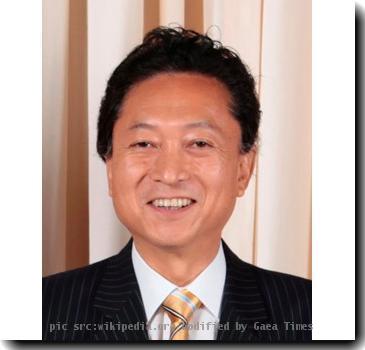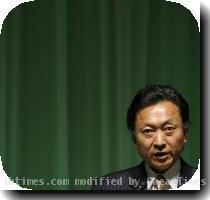Ex-aides to Japan’s PM charged in funding scandal, dashing hopes for new corruption-free era
By Yuri Kageyama, APThursday, December 24, 2009
Ex-aides to Japan’s PM charged in funding scandal
TOKYO — Two former aides to Japanese Prime Minister Yukio Hatoyama were charged Thursday with falsifying reports of campaign contributions — dashing the promise of the leader who vowed to usher in a new, cleaner era in the country’s politics.
Hatoyama bowed deeply at a hastily called news conference, apologizing for the misdeeds of the aides, whom prosecutors accuse of listing dead people as donors to hide the source of some money, as well as underreporting some donations.
Hatoyama rose to power this August partially on the promise that he would end the corruption scandals that many had come to expect of the Liberal Democrats, who ruled the country for most of the past 50 years. His popularity has already begun to wane just 100 days into his tenure, but he refused to resign.
The economy is struggling, and many are not reassured by his recovery plans. His policies to aggressively curb greenhouse gas emissions have alienated corporate circles, and voters are disappointed by his party’s flip-flop on key campaign issues, including lowering taxes, providing cash payments for families with children and relocating a major U.S. military base.
Still, analysts said the scandal was unlikely to do in the government — at least for now.
Prosecutors charged former aides Keiji Katsuba, 59, and Daisuke Haga, 55, with violating laws on political funds. The allegedly falsified reports involved nearly 400 million yen ($4.4 million) in contributions, according to a statement from prosecutors.
Hatoyama, who does not face charges, acknowledged he had received 15 million yen ($170,000) a month from his mother to support his political activities, but he said his aides had handled the money and he did not know about the contributions until the prosecutors’ investigation.
He said he would pay back-taxes and penalties of more than 600 million yen ($6.7 million), dating back to 2002.
“I am not sure if this is something that people can understand, but I hope I can gain your understanding,” he said. “If there is a big cry for Hatoyama to quit, then I will respect that. But I will work hard to avoid that.”
Kyoko Nakatani, a 45-year-old office worker, was outraged.
“I can’t accept the prime minister’s explanation. How can someone who has no control over his own finances hope to steer the country?” she said. “I don’t think he has what it takes to be prime minister.”
Sadakazu Tanigaki, head of the Liberal Democrats, now an opposition party, lashed out at Hatoyama, demanding his resignation.
“This makes a mockery of hardworking taxpayers,” he said. “He should promptly take political responsibility.”
Other lawmakers said they were incredulous a prime minister would not know what his aides were doing. Calls could rise, even among Hatoyama’s fellow Democrats, for new leadership ahead of upper house elections expected next year.
“Lots of observers are saying Hatoyama has not been up to par,” said Robert Dujarric, director of the Institute of Contemporary Japanese Studies at Temple University in Tokyo.
“But I think it’s far too early,” he said of the possibility Hatoyama may be deposed.
Although some prime ministers were exceptions, like the popular Junichiro Koizumi, such scandals were fairly common under the Liberal Democrats, many involving payments from construction and other companies suspected of trying to secure public works projects and curry favors.
Many blamed corruption on the almost total control the Liberal Democrats wielded — ruling nearly uninterrupted since World War II — and had hoped to change it by bringing a new party to power.
Hatoyama, while an opposition legislator, had criticized ruling party politicians who had blamed their aides for scandals, and had demanded they resign.
Cab driver Akio Matsumoto said Hatoyama was beginning to look a lot like his predecessors.
“Just like all the other politicians, Hatoyama blamed everything on his aides. He’s no different from them,” said Matsumoto, 59.
Still, some shrugged it off.
“Every politician has money scandals,” said 30-year-old businessman Takayuki Ota.
Associated Press Writer Shino Yuasa contributed to this report.
Tags: Asia, East Asia, Japan, Political Corruption, Political Issues, Political Scandals, Tokyo, Yukio Hatoyama

